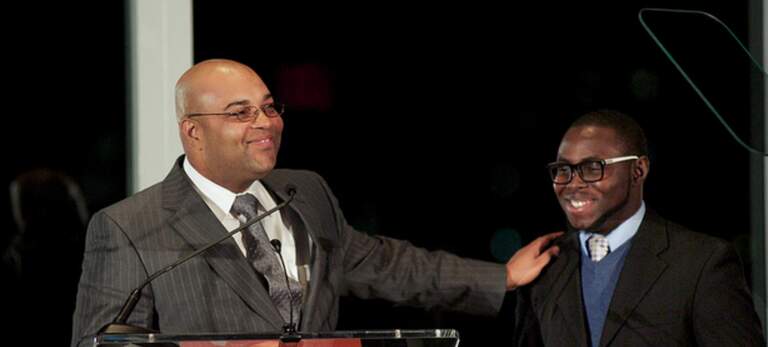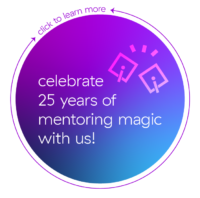When Oladoyin Oladeru was eight years old, his family won the US visa lottery and moved from Lagos, Nigeria to the Bronx, NY. They moved in with an uncle, sleeping 10 people in a one-bedroom apartment for a year before Ola’s family rented an apartment. Ola was a strong student and worked hard in school.
“Growing up, in an African household, the careers you hear about are being a medical doctor, lawyer or engineer,” said Ola. His father hoped Ola would become a physician. Ola wanted to pursue his own ambition and was searching for a different direction.
In high school, Ola met someone who helped him find his own trajectory. Ola was matched with a volunteer mentor, Alphonso Diaz, through iMentor. They exchanged messages once a week and met at Ola’s school one evening a month.
“I remember our first conversation. Al asked me, ‘What do you like to do?’ We talked about technology, computer science, data analytics. I didn't even know about computer science majors at that point,” said Ola. “Having Al in my life helped me see what else is out there.”
Al, like Ola’s parents, urged him to pursue higher education. “Education is power,” said Al. “You have to get educated because that's the one thing no one can take away from you.”
With his mentor’s support, Ola applied to colleges and scholarships. One of the scholarships, the Gates Millennium Scholarship, required 10 essays, and Al read each of Ola’s essays. Al also helped him evaluate the financial aid offers that came with acceptances.
“He played the role of a friend, a college guidance counselor, and a motivating person. He came to my high school graduation. He has been there throughout my educational trajectory,” said Ola.
That was just the start of how Ola and Al would change each other—and be changed—through their mentoring relationship.
A Hustler from the South Bronx
Al saw a lot of himself in Ola. “I was lucky to get matched with Ola because he’s a hustler. I’m a hustler, so we match,” said Al.
Al had grown up on Jackson Avenue in the South Bronx. His dad was Puerto Rican, his mom was from Alabama, and he had been a first-generation student at Fordham University. He knew what it was like to work hard for his education. He grew up in a family of seven that lived in a 3-bedroom apartment, and he often holed up in the bathroom, using a hamper for a desk, because that was the only way he could study without interruptions.
When Wall Street firms came to Fordham to recruit for entry-level jobs, Al saw his chance. Al received an offer to join a program for junior stock traders, and he accepted, despite knowing little about Wall Street. “When you don't have any revenue coming into your household and someone gives you the offer, you go. You take the money,” he said.
On the trading floor, Al started out as a “green floater”—he sat with different traders, observed them as they did their work, and learned all about equities, fixed income, options, and other securities. “Surround yourself with people who are smarter than you. I surrounded myself with Brett McGonegal and all these traders who were making a ton of money,” said Al.
He worked his way up from being a floater to an assistant, then to a trader. He eventually became the first trader hired by McGonegal, who later founded and sold a billion-dollar investment bank to Alibaba’s Jack Ma.
Al was successful because wherever he went, he connected with people and forged relationships. “Ninety percent of what I did was networking,” he said.
As one of a small number of Black men trading on Wall Street, Al joined the college recruitment teams of his employers, partly to show young people of color that there was room for them in finance. He brought Wall Street recruitment to HBCUs. He began to mentor people at work.
“A lot of individuals that make it don't turn around and reach down from that ladder and pull people up. I was always taught that you help others, and you pull people up. And that makes life much greater,” said Al. “The accumulation of items doesn’t mean anything. It's how many people are going to show up at your funeral, how many people are going to remember you.”
This ethos—that true wealth is what you contribute to others’ lives—led him to mentoring and to Ola.
From College to Buying a First House
As Al likes to say, Ola “got paid to go to college.”
Thanks in part to Al’s help, Ola received the Ronald McDonald Scholarship and the Gates Millennium Scholarship, and he graduated from the University of Rochester with a degree in epidemiology.
Even though iMentor’s program officially concludes after a student’s sophomore year in college, many mentees and mentors stay connected afterward. Ola and Al were one of the mentoring pairs who remained close.
They both were driven to get ahead and plan for the future. Ola, like Al, liked to bounce ideas off his mentors and close friends, and Al was one of the people whose opinions he trusted.
When he was considering graduate school at Yale, Al connected him with a friend who was a Yale alum—one of many occasions over the years of Al extending his social capital to his mentee. Ola earned a master’s in public health from Yale and went to work at Deloitte Consulting.
A few years afterward, Ola was again thinking about going back to school—this time for an MBA. And again, Al was an active participant in his decision-making process. Did Ola really want the degree or just the network he would gain? Should he go full-time or part-time? How would it compare to his MPH degree? Should he leverage the MBA for a promotion at work?
“He was literally talking through every scenario, identifying what the pros and cons were, asking me questions about long term goals,” said Ola. “He's my go-to person for those types of tough conversations.”
After so many years, their talks have roamed far from schools and jobs.
One afternoon, as Al was at his child’s soccer game, he got a call from Ola, who was living in Chicago. The mentee shared the news that he was thinking of buying a house, and asked Al for his help. Al checked out the location, looked up the demographics, and called up some friends in real estate. The mentor’s conclusion: It’s not a good investment. Ola decided not to buy the house.
The next year, Ola placed a similar call to Al about a different property. This time, Al gave a thumbs up.
“When I bought my first real estate property, Al was one of the first people I contacted. I took a picture and texted it to him. ‘I finally did it!’” said Ola, who now works at Google. “And now, 3 years later, I am purchasing my fourth investment property next week.”
Ola, observed Al, is on the road to building real wealth.
A Two-Way Street
Two decades after their first meeting, Ola is filled with respect, honor, and appreciation for his mentor.
“Our mentoring relationship has been, by far, one of the best experiences of my life,” said Ola. “The impact of the guidance, the emotional support, the role modeling is lifelong. There’s something so powerful about seeing people who look like you in positions of power. You can imagine yourself being someone similar and having an impact in the world.”
The giving and the support now extends in multiple directions. Today Ola serves as a mentor with iMentor Chicago to a young man named Anthony, and helped his mentee apply to colleges and scholarships just the way Al did for Ola.
Recently, Ola reached out to Al to tell him about a job opportunity at Deloitte. He knew that Al had been pondering a career change to consulting.
“The mentor has become the mentee. He recommended me for a job. I sent my resume to him, he fixed it up, and sent it back to me. He did everything that I would normally do for somebody else,” said Al.
“I don’t think we have a mentor-mentee relationship anymore. I think we have a relationship. A friendship. That’s what I value most about the whole iMentor experience—seeing Ola grow into the young man that he's become and understanding that he's looking back and giving back.”

